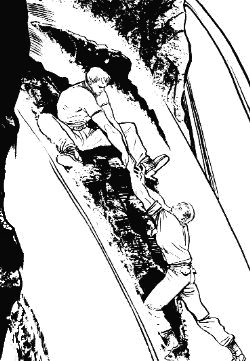Solstice
 This is a story narrated by Hugh Waterhouse, a young man telling about the the Summer Solstice on which his obsessive father died, seeking the legendary Fountain of Youth.
This is a story narrated by Hugh Waterhouse, a young man telling about the the Summer Solstice on which his obsessive father died, seeking the legendary Fountain of Youth.
You might think I’ve just spoilt the plot, but this little bit is really just the setup from the opening pages. There’s far more to this story than the fate of Hugh’s father… like Hugh’s own fate after his father dies, despite the obvious fact that he’s the narrator. And there’s much more to be learned about his and his father’s past as well.
 To give a feel for the book, here’s the opening narration, which starts with the attached picture. “I hold the hand of my father, Russell Waterhouse. My father believes in eternal life. Six months ago he found out his cancer had advanced. Brain tumors. Terminal. Despite this prognosis, my father never believed the cancer would kill him. He was right about that. But this day, June 21st, the summer solstice — the longest day of the year — the longest day of my life — we have both realized that it won’t be cancer that will take my father’s life, though it will be something within him, a desire far more consuming than any disease.”
To give a feel for the book, here’s the opening narration, which starts with the attached picture. “I hold the hand of my father, Russell Waterhouse. My father believes in eternal life. Six months ago he found out his cancer had advanced. Brain tumors. Terminal. Despite this prognosis, my father never believed the cancer would kill him. He was right about that. But this day, June 21st, the summer solstice — the longest day of the year — the longest day of my life — we have both realized that it won’t be cancer that will take my father’s life, though it will be something within him, a desire far more consuming than any disease.”
(OK, one factual quibble, which I’d let go if not for its apparent importance. In Chile, where this scene takes place, June 21 is the shortest day of the year. The rest of the story shows greater attention to detail.)
Unlike many stories which start with the central character as narrator, but which quickly slip into standard linear omniscient-observer form, Solstice reads like real storytelling. It follows Hugh’s meandering train of thought, going off on tangents into reminiscences about his childhood or other earlier events, then apologetically getting back to the “real” story when he (and the reader) suddenly notices that he’s digressed.
I listed the letterer in the credits above because the lettering in this book contributes a lot. By switching from one style to another, she visually distinguishes Hugh’s narrative and expository thoughts from the dialog in the scenes depicted. It’s a minor point, but it helps.
The b&w art is also well done, and quite adaptive. A scene from Hugh’s childhood is rendered in clean lines, with a minimum of shading and simple backgrounds. Scenes in the Chilean jungle are dark, cluttered, hatched, and foreboding. I’ve never seen Justin Norman’s work before, but I hope to see more if it. He’s good.
But the real power behind this book is Steven Seagle’s story, and the characterisation in it. The relationship between Hugh and Russell Waterhouse is fascinating (in much the same way as a train wreck), and I’m dying to see what happens to Hugh now that… well, that would be a spoiler. {grin} If you’ve liked - or been disappointed with the pace of - Seagle’s “limited” series Primal Force for DC, this shows Seagle in prime form.
